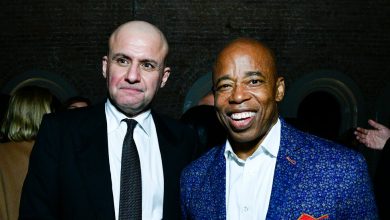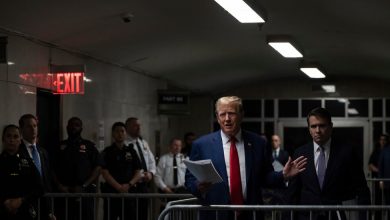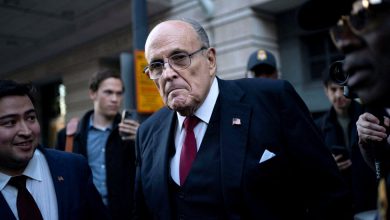How Columbia’s President Has Avoided Fallout Over Israel-Hamas Protests

In the weeks after Oct. 7, Columbia University was the scene of rising tensions over the Israel-Hamas war on American college campuses.
A Jewish student said he was assaulted after putting up posters of hostages. Pro-Israel and pro-Palestinian students accused one another of support for genocide in a series of heated protests and counter-protests.
But as the fall semester ended, Columbia faded from the spotlight even as its peer schools, Harvard and the University of Pennsylvania in particular, were scrutinized over their responses to the war and claims of antisemitism on campus.
Supporters of Columbia’s president, Nemat Shafik, credit her diplomatic skills in avoiding a similar public relations crisis. But detractors said she has bent too far to the demands of Israel supporters, angering students and some faculty members but keeping powerful donors and trustees mostly happy.
She might also have benefited from a bit of luck.
When Congress invited her to a congressional hearing on antisemitism on Dec. 5 with her peers from Harvard, Penn and M.I.T., Dr. Shafik said she could not go. She told representatives that she had already planned to attend the COP28 climate conference in Dubai, where she introduced a panel about women leaders.
The Congressional hearing did not go well. The University of Pennsylvania president lost her job and the Harvard president became mired in weeks of controversy.
But instead of fighting for her job, Dr. Shafik was announcing a new initiative, called Values in Action, in which she called for informed debate, not “taunts and cruelty.”
Still, she is walking a precarious path.
Her call for compassion and respect, some students said, does not reflect what they say has been a repressive effort to rein in pro-Palestinian protesters that has gone farther than at other Ivy League universities: In November, Columbia’s administration made the extraordinary decision to suspend temporarily two pro-Palestinian student groups, Students for Justice in Palestine and Jewish Voice for Peace.
“I just think the university is not identifying the proper threat,” said Deen Haleem, a third-year law student and a leader of Law Students for Palestine. “The current threat right now are the universities that are shutting down pro-Palestine speech.”
Through a spokeswoman, Dr. Shafik, who also goes by Minouche, declined to be interviewed. Her supporters say she has taken a practical approach to the crisis and has done well in addressing different constituencies that are often in conflict.
Board members, including pro-Israel voices, say they are pleased at how the president has maneuvered.
“I think it’s very difficult, but I think she did as well as anyone could have done,” said Victor Mendelson, a Columbia trustee who supports Israel and Dr. Shafik. “She’s been responsive. She’s been out and about on campus and she’s been very careful to try to make everyone feel welcome. I mean, everyone who is following the rules, obviously.”
Like several of her Ivy League presidential peers, Dr. Shafik was appointed to her role only recently — in her case, in July. An economist born in Egypt, she has deep experience in handling complex international situations. She is a former deputy governor of the Bank of England and a former deputy managing director for the International Monetary Fund. Most recently, she was president of the London School of Economics.
While she is known for her support of diversity initiatives, Dr. Shafik’s views on politics — and the way her personal experiences may have influenced them — can be hard to decipher. Mr. Mendelson said that as Columbia scrutinized her before she became president, the search committee was impressed that she had been “meticulously nonpartisan” in her previous job.
“One couldn’t figure out her personal views because she wanted that evenness on campus,” he said. “That’s one of the key reasons I was supportive of her candidacy for president.”
Two days after the Hamas attacks on Oct. 7, Dr. Shafik issued a statement saying she was “devastated by the horrific attack on Israel,” adding that “we must reject forces that seek to pull us apart.” But in the days that followed, protests became so tense that the university closed its campus to outsiders and postponed a major fund-raising drive.
Then, on Nov. 10, it suspended the two pro-Palestinian student groups. According to a statement from Gerald Rosberg, the chair of the school’s Special Committee on Campus Safety, the action was justified because the two groups had repeatedly violated university policies requiring them to get permission and give 10 business days’ notice before holding an event.
Student groups criticized the 10-day rule, saying it violated free speech protections. Jaxon Williams-Bellamy, a law student and delegate to the University Senate, said it was “too onerous and creates a chilling effect.”
Columbia administrators said the rule had been in place for years, though it was not always enforced, and that the school was working with the Senate to amend the policy.
Mr. Rosberg’s statement also cited “threatening rhetoric” during one of the groups’ demonstrations, but students said they were never informed of what that rhetoric was. One student on the outskirts of a Nov. 9 protest had shouted antisemitic curses, but he was not affiliated with any of the student groups, and was shouted down by the pro-Palestinian protesters, several students said.
The university administration later said that the rhetoric was not the cause of the suspension.
Dr. Shafik’s other actions have included creating an antisemitism task force along with a “Doxing Resource Group” to help student protesters who face harassment after their identities are revealed online, a tactic that has targeted pro-Palestinian students in particular. She has also gone to interfaith meetings, Hillel events and a Muslim Student Association meeting, and has met with students affected by the war, her office said.
She has not, however, met with leaders of the suspended Palestinian groups, student leaders said.
The new civility initiative is meant to calm the campus through a series of listening forums and training sessions, among other things. The school’s 18 deans released a joint letter in support of the program, calling on pro-Palestinian protesters to stop chanting phrases, such as calls for “an intifada,” that can be “experienced by many as antisemitic and deeply hurtful.”
Rashid Khalidi, the influential Palestinian historian at Columbia, released a scathing statement in response: “This statement amounts to a new norm that prohibits using or learning about these terms and their histories, in favor of the privileging of a politics of feeling. While perhaps appropriate to a kindergarten, it is hard to imagine an approach more contrary to the most basic idea of a university.”
The letter from the deans also asks students to acknowledge the anguish of pro-Palestinian students mourning the loss of life in Gaza.
Ester R. Fuchs, one of the co-chairs of the new antisemitism task force, credited Dr. Shafik with “lowering the temperature” on campus.
“Over 300 kids gathered for a Hanukkah candle lighting on campus recently, for example, and you don’t hear about it,” she said. There was no incident.” Claire Shipman, the co-chair of the university’s board of trustees, praised the president’s calm approach toward crisis management.
“We have to focus as a university — and this is where Minouche is so good — on moving to a place where people are listening and engaging in conversation, not only protesting,” Ms. Shipman said.
But student organizers see her differently. The request to self-police protest chants feels like a trap and not free speech, said Mohsen Mahdawi, a co-founder of Dar, the school’s Palestinian student union.
“I am all for compassion and tolerance,” he said. “But there should be no double standards. People have to be treated equally with dignity.”
Some students predicted that Dr. Shafik’s efforts to contain the conflict on campus would only lead to more of it in the coming semester. Columbia’s student governing board voted to declare noncooperation with the event policy, the Columbia Spectator reported. Pro-Palestinian groups reorganized and are planning protests under the name Columbia University Apartheid Divest.
Yoni Kurtz, 21, is a junior studying history and the Hillel student president. He said that while some Jewish students didn’t feel comfortable with the tenor of some pro-Palestinian demonstrations, suspending the groups was a step too far.
“There’s a real distrust from basically almost any student you talk to of almost anything the administration does or will do, basically no matter their political beliefs,” he said. “Most students really just don’t believe the administration has their best interest in mind.”




